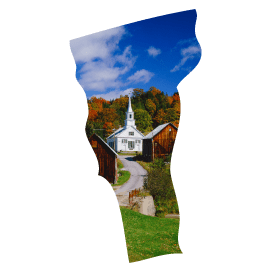Secondary Teacher Preparation in Science:
Vermont
Delivering Well Prepared Teachers Policy
Analysis of Vermont's policies
Vermont offers a secondary endorsement in general science. Candidates are required to earn a major in biology, chemistry, physics, or earth/environmental/atmospheric sciences or the equivalent in undergraduate and/or graduate coursework. They must also achieve a passing score on the Praxis II "General Science" multiple choice or essay test and one subject-specific test of their choosing. Teachers with this license are not limited to teaching general science but rather can teach any of the topical areas.
Middle school science teachers in Vermont must earn a middle grades endorsement. Candidates are required to earn a minor in the content area and, commendably, must also pass the Praxis II "Middle School Science" content test.
Recommendations for Vermont
Require secondary science teachers to pass tests of content knowledge for each science discipline they intend to teach.
States that allow general science certifications—but don't require passing scores on content tests for each subject area taught—are not ensuring that these secondary teachers possess adequate subject-specific content knowledge. Although Vermont's requirement of a passing score on a single-subject content test is a step in the right direction, it only ensures requisite subject matter knowledge in one area. That leaves out all the other science courses that could be taught at the secondary level with a general science endorsement.
State response to our analysis
Vermont recognized the factual accuracy of this analysis.
Select another topic
Delivering Well Prepared Teachers
- Admission into Preparation Programs
- Elementary Teacher Preparation
- Elementary Teacher Preparation in Reading Instruction
- Elementary Teacher Preparation in Mathematics
- Middle School Teacher Preparation
- Secondary Teacher Preparation
- Secondary Teacher Preparation in Science
- Secondary Teacher Preparation in Social Studies
- Special Education Teacher Preparation
- Assessing Professional Knowledge
- Student Teaching
- Teacher Preparation Program Accountability
Expanding the Pool of Teachers
Identifying Effective Teachers
- State Data Systems
- Evaluation of Effectiveness
- Frequency of Evaluations
- Tenure
- Licensure Advancement
- Equitable Distribution

